A perspective on life, finance, politics and things that make the world move
Don't wanna be here? Send us removal request.
Text
The Failure of US Foreign Policy Forever-Wars & Illusions of Victory
January 3rd 2020 will be remembered as the day that a tectonic shift in the dynamics of US and Middle Eastern politics occurred, forever changing the worlds view on American foreign policy, its moral standing on the world stage, as well as its intentions in the region and worldwide.
Since WWII, the self-adopted American role in world politics has been that of the global policeman, the bringer of “democracy”, and the “liberator” of what Washington deem to be oppressive regimes. The popular assumption within the walls Congress and the White House is, that the rest of the world needs what America has – a democratic political process, ideally in such a way that US commercial interests are met by the outcome, although these interests are often hidden behind a veil of the insistence on democracy and its benefit for the people of the target nation. The fatal flaw in this logic lies therein that an inherent lack of understanding of local culture, religion and social conventions has blinded US lawmakers from the underlying issues of the regions where such intervention and oftentimes blatant calls from regime change have been attempted.
This theme is a permanent feature of US foreign policy in every conflict that the US has become embroiled in, be it Korea and Vietnam, or Afghanistan, Iraq, Libya, Syria and the perpetual obsession with destabilizing Iran. The source of all of these questionable policy decisions by Washington can be traced back to a simple notion – the American hubris of assuming that what America does and how it operates is the ideal model to be implemented in the rest of the world, regardless of fundamental religious and cultural differences in its target-nations. Whilst America enjoys a long and very colourful history of political intervention, the main ones that shall be focused on are the Middle Eastern conflicts, simply as these are the most obvious policy errors that the US have become engulfed in, whilst it must be said that the tentacles of the American foreign policy extend far beyond this region.
Whenever a stable and operating system is threatened or toppled, the inevitable result is the filling of that void with some form of chaos whilst society recalibrates its political and social compass, adjusting to the changing landscape of the country in question. Undoubtedly sometimes this can also bring about positive developments, although finding examples of this has proven to be more difficult than one would expect at first glance.
The notion of the American brand of democracy being the superior brand of this political ideology should be fundamentally questioned after exploring the US political process in closer detail, with the elections being decided by the electoral college (which is not necessarily representative of the true will of the people), whilst political decisions of a sitting president are largely dictated by who holds the majority in the Senate and House of Representatives. Could it perhaps even be considered undemocratic of a Republican dominated Senate to veto the majority of the president’s decisions, despite the fact that the majority of the population has voted to entrust this individual with the ruling power for the term of his or her time in office?
Different brands of democracy must surely be explored, as one size clearly does not fit all.
Libya
Whilst Colonel Ghaddafi certainly is a controversial figure, it must be said that Libya enjoyed long periods of economic and social stability under his rule, turning Libya into the most wealthy country in Africa largely due to the abundance of crude oil and natural gas. Whilst there is evidence to support cases of human rights abuses perpetrated under Ghaddafi’s leadership, when compared to the current situation that the world is witnessing there, the question must be asked which of these two outcomes was the lesser evil? Are the vast majority of Libyans better off now than they were prior to regime change?
The US-led interventionist campaign, which led to the overthrow of Ghaddafi and his government, left behind a gaping power void and social chaos, as the newly brought “freedom” that the US preached, led to widespread lawlessness, violence and tens of thousands of civilian deaths in the name of liberating this nation from their previous established and functioning government.
We must ask ourselves the fundamental question – if the US version of democracy is indeed the superior form of government as it is consistently preached to us, then why is the state of Libya in complete turmoil since so-called “democracy” was brought to its shores?
One reason for this is surely cultural, with tribal allegiances being of much greater importance in the Middle East than in Europe or the US, which is a fact that many outside actors do not understand. The transition of Libya from a state of relative stability and prosperity, the result that democracy has brought surely cannot be seen as the optimal outcome. Economic considerations must also be made when looking at the form of government that is prevalent in different nations.
Libya’s economy is fairly one dimensional, with the vast majority of the countries revenues being generated from the production and subsequent sale of crude oil and natural gas. In many countries where economics conditions are not based on a large number of factors, but come from a small number of income sources, dominant leaders tend to be in control. Is this because these individuals are power hungry and selfish figures, or because countries with less complex but extremely lucrative exports would not function properly if a “democratic” system was introduced?
Would Libya have reached the economic prosperity that it at one point had if the Senate or House of Representatives was permanently counteracting the decisions of the leadership? When comparing the developments since the US intervention in Libya, it is challenging to not arrive at the conclusion that the country as an economy, and the citizens of Libya were in fact better off under the rule of a strong, autocratic leader such a Ghadaffi, who had sufficient power to ensure that the delicate social fabric and one-dimensional economic inputs led to a favorable outcome for the majority of citizens in Libya.
On this train of thought, it is possible to venture down the path of saying that the way Ghadaffi ruled, was in fact by some definition a democratic style, as his decisions resulted in a favorable outcome for the vast majority of the citizens of Libya.
Libya pre and post US invasion:
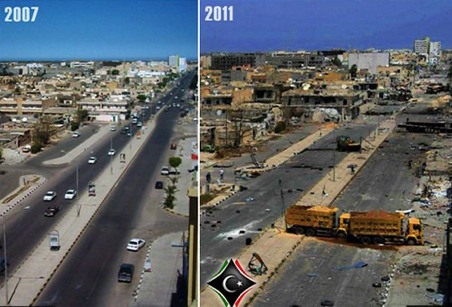
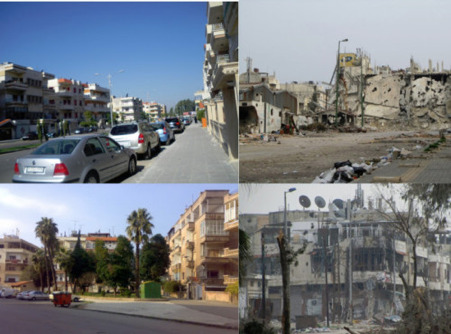
Afghanistan
The US campaign in Afghanistan began in 2001 and has not ended until this day. The narrative for invading Afghanistan was that the Al-Qaeda members responsible for the attack on September 11 had been trained and harboured by the Taliban. The fact that the majority of the perpetrators in the attack were actually from Saudi Arabia (whilst none were Iranian, Iraqi or Afghan) was largely ignored by the Bush administration, mainly due to the relationship between Saudi and the US in defense contracts as well as their strategic partnership aimed at exerting US influence over the Shiia majority population of the neighboring nations such as Iraq, Iran, Syria and Lebanon.
To get an understanding of the duration of the Afghan military campaign, many of the US troops currently in Afghanistan, would only just have been born at the time that the invasion initially took place.
18 years of war after the initial landing of troops in Afghanistan, the US has slowly come to the concerning conclusion that this is a war that was in no way won by Washington, as the Taliban reemerge as the preeminent political party. The US campaign has cost the taxpayer over $1 trillion, as well as countless casualties on both sides, and has yielded no result whatsoever, except the killing of Osama bin Laden (although this occurred in Pakistan). For all intents and purposes, the political fabric of Afghanistan now is very similar as it was in 2001 prior to the invasion.
Syria
Syria’s secular, internationally recognized government under Assad refused to allow an oil and gas pipeline, from Saudi Arabia and Qatar to traverse its territory upwards towards the European market. For its defiance, Syria paid a heavy price, as the Obama administration began deploying money, weapons and arms to a jihadist concoction made up of Al Qaeda, Al Nusra, and Daesh invaders, in the hope that this would destabilize Syria to the point of surrender, and turn it into a defacto Saudi & US subservient state.
The brutal battles that were to ensue are well documented, with the rise of Daesh and extremist factions enslaving the local population and bringing tyranny to the entire region, as well as being directly responsible for the deaths of hundreds of thousands of Syrian civilians. The primary resistance to the Daesh insurgency came from Iran and neighbouring Iraq (through its army and affiliated armed groups), with the support of Hezbollah-aligned groups that united in the battle against this extremist savagery.
With the US attempt to bring “democracy” to Syria, what they produced was the most ruthless and inhumane terrorist group in living memory. The sheer existence of groups such as Daesh and Al-Nusra were only possible through the direct and indirect support of Washington and Israel, as the regional instability gave both of those nations the power they so dearly crave in the Middle East, with their presence being justified under the guise of protecting the local population.
Although Daesh pushed forward all the way to Baghdad, the resolve and commitment of the local Iraqis and their supporters succeeded in overpowering the Daesh terrorists through enormous personal sacrifices, as armed Shiia groups pushed Daesh out of Iraq, followed by Syria. Assad remains in power, whilst the US slowly withdraw from this battleground. The massacres of Aleppo, Mosul, Kobane and countless other cities that were in the hands of Daesh should serve as a reminder of the consequences of destabilizing a functioning government, no matter if you agree with their philosophy or not.
Syria pre and post US invasion:
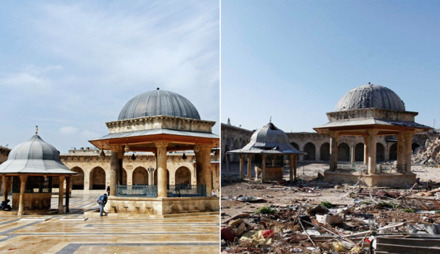
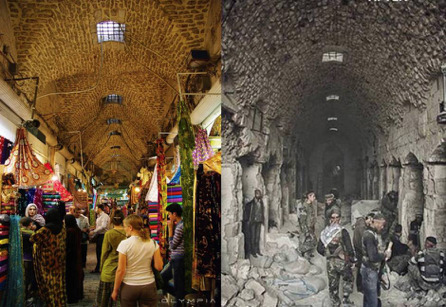
Iraq
The removal of Saddam Hussein from the leadership of Iraq marks another tragic chapter in Middle Eastern and US political history. From what is now clear, the invasion of Iraq was based on entirely fabricated evidence regarding the presence of weapons of mass destruction, as a means of furthering US commercial and political interests in the region, as Iraq was viewed as a threat to US influence in the region. As one of the countries with the largest populations, an abundance of natural resources such as crude oil and natural gas, coupled with a large army that was built up during Saddams rule, Iraq became a natural target for US intervention.
The unwillingness of Saddam to cave to US demands further added an incentive for the US to provoke a confrontation, as history has shown that this is generally the outcome when a country refuses to comply with American demands, no matter how illogical some of these sometimes are.
A general environment in the US of Muslim-phobia coupled with an enormous anti Middle Eastern marketing push by the US administrations, assisted in convincing the majority of Congress of the very ill-informed decision to proceed with military action against Iraq, despite the fact that Saddam had never actually threatened the US with an attack. The landing of American troops on the shores of Iraq marked the beginning of a long period of chaos, as US forces swept through the country, removed Saddam from power and implemented their caretaker government whilst they figured out what to do with this situation that they had created.
Under Saddam there were strict rules in Iraq as to what information was shown on television, what opinions were tolerated and how people were to behave, none of which sounds particularly appealing, but also lead to a certain sense of order. The American invasion brought what the US pitched as “freedom” to the Iraqi people. Freedom from a leader who was undoubtedly oppressive, but this new-found freedom also seemed to include the assumption that no rules applied any longer, and a general state of lawlessness ensued. Rules were no longer abided by, weapons were freely available to the population, and the country was plunged into a state of disarray yet again.
The purported weapons of mass destruction that the Bush administration claimed were the basis for the invasion were never found, even with over 100’000 US soldiers being present in Iraq during this time. The fact that the reason for invading Iraq in the first place turned out to be a complete lie has been largely dismissed by the Presidents that have been in power since Bush, and no accountability for the untold destruction that has been caused by the US is in sight. The notion that when the US intervene it is called “bringing democracy”, whilst when other nations behave the same way it is deemed to be terrorism.
Terrorism is defined as the unlawful use of violence and intimidation, especially against civilians, in the pursuit of political aims.
Some would say the above definition and what the US forces have done in Iraq enjoy a certain amount of overlap.
Baghdad -2000
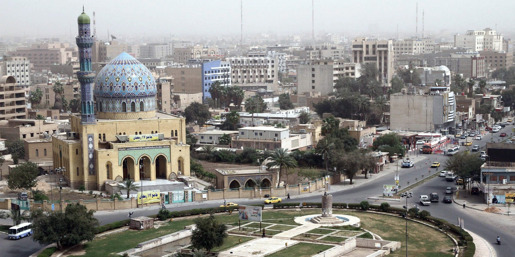
Baghdad - 2004
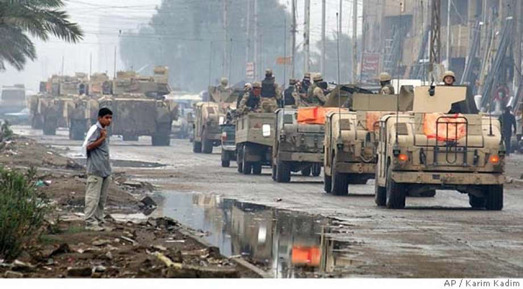
Mosul
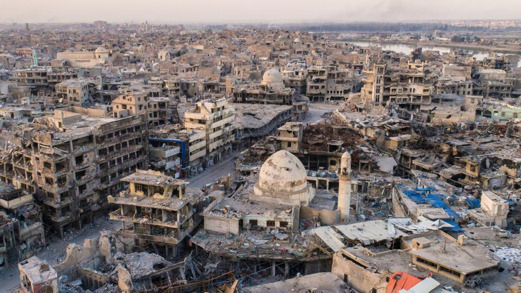
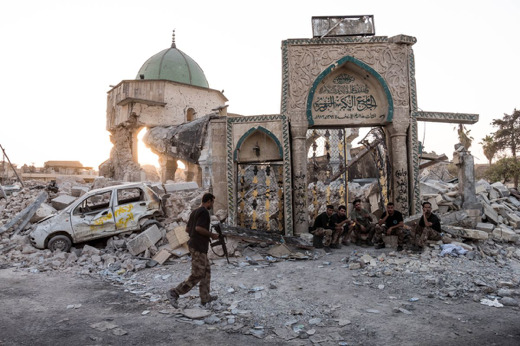
Iran
The Islamic Republic of Iran has for a long period of time now held the prize as the country that the US despises the most in the entire region. The reason for this is quite simple, in that it is mainly based on the Iranians standing their ground, and not giving in to American demands, whilst pushing back against hostile and destabilizing behavior of Israel in the Middle East.
Iran is simply too big, and has too much internal social cohesion for the US to be able to overthrow the government. As the Iranian Foreign Minister so eloquently phrased it, “beautiful military equipment doesn’t rule the world, people rule the world. The US needs to wake up to the reality that the people of this region are enraged, that the people of this region want the United States out”
The hostile environment between the US and Iran can largely be attributed to the influence of the Israelis, as the fire of anti-Iran sentiment is consistently stoked by Netanyahu’s rhetoric, always preaching the impending destruction of Israel at the hands of Iran. The reality is a little different – Iran will defend itself if attacked, but has a very long history of not actually attacking anyone. A point that is generally ignored by western media, is the role that Iran and particularly General Qassem Soleimani played in the defeat of Daesh, and driving back the terrorists until their entire dismantling, virtually ending their rule of terror in the region.
Without Iran and General Soleimani, the entire region would currently be in an even more extreme state of chaos, and assuming that most of Iraq and Syria would now be Daesh territory is not a stretch by any means. The extreme sacrifices of the Iraqi’s and Iranians fighting against Daesh receives too little recognition, as can be seen by the IRGC and General Soleimani being labelled “terrorists” by the United States, when the reality is that the bulk of the fighting against Daesh, the real terrorists, was done by these individuals. The result of opposing the US hegemony was tragically displayed in the first week of January 2020 in Baghdad, as General Soleimani was assassinated by an unprovoked US airstrike whilst on an official invitation of the Iraqi government, in the midst of peace negotiations between Iran and Saudi Arabia.
What reason would the US possibly have for assassinating the man that is largely regarded as a hero in his region, defeated Daesh, and is trying to promote regional stability and peace through an improvement of relations with Saudi? And is it realistic that 7 million people in Tehran turn up to the funeral of someone they consider a terrorist?
Perhaps the reason is that the US does not want stability in this region, and that the chaos is what they seek in pursuit of a very warped and misinformed political agenda. No US president in recent history has visited Iran. How can so much hatred be harboured for a country that the President has never seen with his own eyes, and has not threatened the United States or perpetrated any terrorist attacks?
Iran is the kryptonite that America never expected it would be. The people of Iran are united in their loyalty both to their people and country, and refuse to be bullied by the American war machine.
Funeral of General Soleimani, Tehran
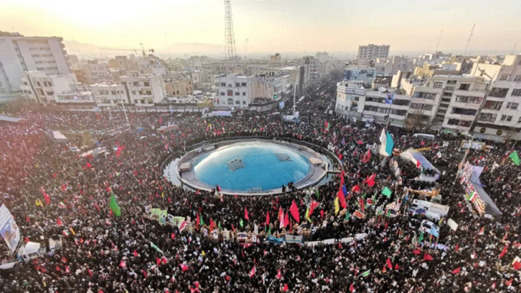
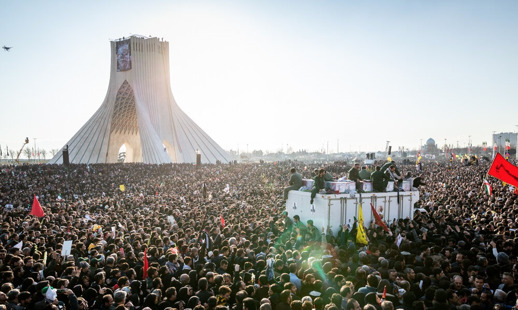
Endgame
No other country in the world has anything remotely like the B-2 bombers that flew bombing runs over Libya from a base in Missouri.
Nor does anyone else have a fleet of 500 aerial refueling tankers that can keep the B-2 and other warplanes airborne for many hours.
Nor does anyone have the amphibious ready groups, the overhead reconnaissance assets, or the inventory of smart munitions employed by the US military. Even the V-22 Osprey "tilt- rotor" aircraft used to rescue a downed American pilot is unique - no other country has tried to build one, much less field a sizable force of them.
The world has never seen a military force like the one America operates today.
But is it all affordable for a country that is seeing its share of global wealth steadily decline, a country that doesn't want to raise taxes despite a $1.5 trillion deficit?
Is an army of such incredible capability really necessary when you say your form of government is the superior model, or does the US form of government only work because of the sheer fire power of the army, so that anyone who doesn’t agree has to watch their cities being pulverized by the most complex and powerful weaponry in the world?
The US have spent $7 trillion fighting wars in the Middle East, and thousands of US soldiers have lost their lives, for a purpose that does not seem worthy of sacrificing a human life for, namely political and economic influence in a region that does not welcome an outside presence like the US.
Is the United States a safer place because of the intervention in the Middle East, when you consider that none of the countries that have been invaded have ever threatened the United States with an attack?
The fact is, the only terrorist attack that has happened on US soil, was perpetrated by citizens of Saudi Arabia, a country which has not been invaded, and is by far the largest buyer of US weaponry, whilst the rest of the region burns.
Perhaps the time has come for the US to turn their focus on their own domestic issues, and allow the rest of the world to discover its own form of democracy, with each country selecting the version of this concept that works the best for themselves.
“No man is good enough to govern another man, without the others consent”
Abraham Lincoln
3 notes
·
View notes